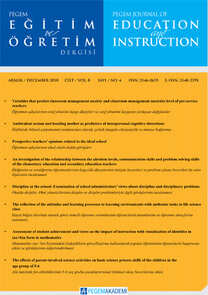Investigation of The Environmental Problems Attitudes of the Undergraduate History Student
___
Akbaş, O. (2004). Türk Milli Eğitim Sisteminin Duyuşsal Amaçlarının İlköğretim II. Kademedeki Gerçek leşme Derecesinin Değerlendirilmesi, Gazi Üniversitesi, Eğitim Bilimleri Enstitüsü, Yayımlanmamış Doktora Tezi, Ankara.Bacanlı, H. (1999). Duyuşsal Davranış Eğitimi, Nobel Yayın Dağıtım: Ankara
Bloom, B.S. (Ed.). Engelhart, M.D., Furst, E.J., Hill, W.H., Krathwohl, D.R. (1956). Taxonomy of Educational Objectives, Handbook I: The Cognitive Domain. New York: David McKay Co Inc.
Brett, A., Smith, M., Price, E., & Huitt, W. (2003). Overview of the affective domain. Educational Psychology Interactive. Valdosta, GA: Valdosta State University. Retrieved [date], from http:// www.edpsycinteractive.org/brilstar/chapters/affectdev.pdf retrieved from 13.03.2021
Broekens, J., Kosters, W. A. ve Verbeek, F. J. (2007). Affect, anticipation, and adaptation: Affect-controlled selection of anticipatory simulation in artificial adaptive agents. Adaptive Behavior, 15(4), 397-422
Büyüköztürk, Ş., Kılıç Çakmak, E., Akgün, Ö.E., Karadeniz, Ş. ve Demirel, F. (2014). Bilimsel araştırma yöntemleri (17. Baskı). Ankara: Pegem Yayınları
Erol, G.H. (2005), Sınıf Öğretmenliği İkinci Sınıf Öğrencilerinin Çevre ve Çevre Sorunlarına Yönelik Tutumları, (Yüksek Lisans Tezi). Pamukkale Üniversitesi, Fen Bilimleri Enstitüsü, Denizli.
Gömleksiz, M. N. Kan, A. Ü. (2012). Affective Dimension İn Education And Affective Learning, Turkish Studies - International Periodical For The Languages, Literature and History of Turkish or Turkic, 7(1), 1159-1177
Güven, İ., Yurdatapan, M., Benzer, E. ve Şahin, F. (2013). Fen bilgisi öğretmen adaylarının çevre sorunlarına yönelik tutumları ile sağlıklı yaşama yönelik tutumlarının değerlendirilmesi. Kastamonu Eğitim Dergisi, 21(4 (ÖS)), 1431-1448.
Güven, O. (2017). Fen bilgisi öğretmen adaylarının çevre problemlerine yönelik bilimsel düşünme alışkanlıklarının incelenmesi, Yayınlanmamış Yüksek Lisans Tezi, https://tez. yok.gov.tr/ retrieved from 13.03.2021
Kahyaoğlu, M., Daban, Ş. ve Yangın, S. (2008). İlköğretim öğretmen adaylarının çevreye yönelik tutumları. DÜ Ziya Gökalp Eğitim Fakültesi Dergisi, 11(1), 42-52.
Karasar, N. (2003). Bilimsel Araştırma Yöntemi, Ankara. Nobel Yayın Dağıtım
Kesicioğlu, O.S. ve Alisinanoğlu, F. (2009). 60-72 Aylık Çocukların Çevreye Karşı Tutumlarının Çeşitli Değişkenler Açısından İncelenmesi, Ahi Evran Üniversitesi Eğitim Fakültesi Dergisi, 10(3), 37-48.
Kışoğlu, M., Yıldırım, T., Salman, M. ve Sülün, A. (2016). İlkokul ve ortaokullarda çevre eğitimi verecek olan öğretmen adaylarında çevre sorunlarına yönelik davranışların araştırılması. Journal of Education Faculty, 18(1), 299-318.
Lopes, P. N., Brackett, M. A., Nezlek, J. B., Schütz, A., Sellin, I. ve Savery positivey, P. (2004). Emotional intelligence and social interaction. Personality and Social Psychology Bulletin, 30(8), 1018-1034.
Özdemir, E. (2015). Tarama Yöntemi. M.Metin (Ed.). Kuramdan Uygulamaya Eğitim Bilimlerinde Bilimsel Araştırma Yöntemleri (S. 77 – 97). Ankara: Pegem Akademi.
Özpınar, D. (2009). İlköğretim 4. ve 5. Sınıf Öğrencilerinin Çevre Sorunları Hakkındaki Görüşleri, Yayınlanmamış Yüksek Lisans Tezi, https://tez.yok.gov.tr/ retrieved from 13.03.2021
Savickiene, I. (2010). Conception of learning outcomes in the Bloom’s taxonomy affective domain. Quality of Higher Education,7,37-59.
Şama, E. (2003). Öğretmen Adaylarının Çevre Sorunlarına Yönelik Tutumları. G.Ü. Gazi Eğitim Fakültesi Dergisi, 23(2), 99-110.
Tabachnick, B.G. Fidell, L.S. (2013). Using Multivariate Statistics (6th ed.) Boston: Pearson.
Tecer, S. (2007). Çevre İçin Eğitim: Balıkesir İli İlköğretim Öğrencilerinin Çevresel Tutum, Bilgi, Duyarlılık ve Aktif Katılım Düzeylerinin Belirlenmesi Üzerine Bir Çalışma, Yayınlanmamış Yüksek Lisans Tezi, https://tez.yok.gov.tr/ retrieved from 13.03.2021
Tekin, H. (2003). Eğitimde Ölçme ve Değerlendirme, (Gözden Geçirilmiş 16. Baskı), Yargı Yayınevi, Ankara
Timur, S. ve Yılmaz, M. (2011). Fen bilgisi öğretmen adaylarının çevre bilgi düzeylerinin belirlenmesi ve bazı değişkenlere göre incelenmesi. Gazi Üniversitesi Gazi Eğitim Fakültesi Dergisi, 31(1), 303-320.
Timur, S., Yılmaz, Ş. and Timur, B. (2013a). İlköğretim öğretmen adaylarının çevreye yönelik tutumlarının belirlenmesi ve farklı değişkenlere göre incelenmesi. Ahi Evran Üniversitesi Kırşehir Eğitim Fakültesi Dergisi, 14(2), 191-203.
Timur, S., Yılmaz, Ş. and Timur, B. (2013b). Öğretmen adaylarının çevreye yönelik davranışlarının incelenmesi. Yüzüncü Yıl Üniversitesi Eğitim Fakültesi Dergisi, 10(1), 169-189.
Uyar, S. N. (2009). Ortaokul öğrencilerinin çevre ve çevre problemlerine yönelik görüşlerinin farklı değişkenler açısından araştırılması, Yayınlanmamış Yüksek Lisans Tezi, https://tez. yok.gov.tr/ retrieved from 13.03.2021
- ISSN: 2146-0655
- Yayın Aralığı: 4
- Başlangıç: 2011
- Yayıncı: Pegem Akademi Yayıncılık Eğitim Danışmanlık Hizmetleri Tic. Ltd. Şti.
Foreign Language Anxiety and Gifted Students in Turkey
In-demand Soft Skills and Employability during and Post COVID-19: Evidence from EFL Teachers
Ahmad A.S. TABİEH, Hiba Y ABUZAGHA, Kazim A. Al GHOU
Fine Reffiane, Sudarmin, Sigit Saptono, Wiyanto
Development and implementation of mathematics attitudes scale for the primary and secondary students
Mehmet GÜLBURNU, Kenan YILDIRIM
Investigation of The Environmental Problems Attitudes of the Undergraduate History Student
Volkan DURAN, Cengiz ATLI, Zeynep Müjde SAKAR, Kenan BAŞ
Fatmanur ÖZTÜRK, Kürşad SERTBAŞ
The Activation of Learners’ Metacognition to Promote Learning Autonomy of Good Language Learners
Aam Ali RAHMAN, Anggi ANGRAENİ, Rizal Ahmad FAUZİ
